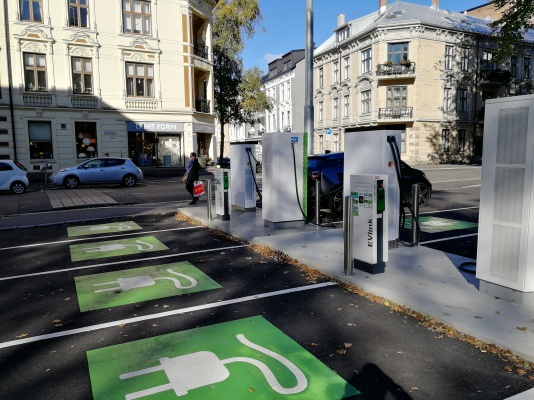On 24 September, ASSURED presented during the workshop on ''Strategies & needs on EV fast charging infrastructure for urban freight'' in Oslo, Norway. Taking place back-to back with the EEVConvention on Policies and Best Practices, the aim of this workshop was to discuss strategies and needs of cities and operators for upscaling electric full-size commercial fleets and fast charging infrastructure, with a focus on urban freight and service trips.
The workshop fostered the debate and exchange of visions and approaches between the different parties involved, in order to improve cooperation and mutual understanding and consequently define effective measures for a full-scale deployment of e-freight vehicles and an adequate charging infrastructure network.
The workshop also featured a site visit of Oslo's EV charging infrastructure.
The debate and exchange of visions and approaches between the different parties were aimed to:
- Improve cooperation and mutual understanding
- Discuss effective measures for a full-scale deployment
- Validate output of ASSURED Deliverable 2.1 - Specification of city & PT stakeholders strategies and needs
The main conclusions of the workshop were as following:
For local authorities, it is importand to closely work with logistics operators and stakeholders to understand and optimise the supply chain, and consequently implement the most effective solutions.
The observed trend of the number of vehicles circulating in cities tells that the number of private cars is decreasing, but the number of vans (and related congestion) is increading. This is due to two main factors:
- Ecommerce-related operations
- Lack of 2.5t-3.5t E-Freight Vehicles (EFVs)
In some countries (e.g. Spain), the majority of vehicles associated to big logistics operators is owned by sub-contractors. This aspect must be cosidered when location and usage of (fast) charging stations is planned and assessed.
Contrary to what happens with private users, tax incentives are not effective for professionals (they are often exempted anyway). Therefore, there is the need for other solutions, linked to:
- Stakeholder engagement
- Incentives
- Regulation
Regulation: polluter pays principle generally accepted by all the operators.
Cities generally face a trade-off when implementing e-mobility strategies: scarce space (off-street) vs visibility & promotion (on-street).
Matching charging infrastructure for goods and passenger flows is difficult. General vision: EFVs should be charged in the freight operators' depots (or at home in case the vehicle is owned by subcontractors). However, they should be able to use public fast charging infrastructure when necessary, as long as the technology does not eliminate the need for intermediate recharging, increasing the range of the batteries.
The next project developments should further take into account urban freight operators and their needs. Understanding how they move in the network or carry out deliveries/collection is key to identifying the types of charging infrastructure to be provided. Moreover, the role of charging service providers needs to be further emphasised.
You can find the participant list, the agenda, and all presentations, via the followings links:
ASSURED_workshop_Participants_list
2-Giacomo_Lozzi-_Polis_Network
3-Angel_Lopez_Rodriguez-_City_of_Barcelona
4-David_Talbot-_Transport_for_London
6-Marie-Jose_Baartmans-_BREYTNER
7-May_Lopez_Diaz-_SEUR_---_DPD_Group
8-Aaron_Fishbone-_GreenWay_---_VOLTIA
